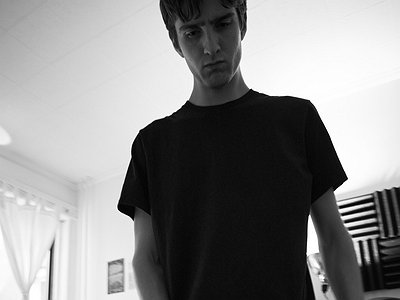Part 1
Name: Telo Hoy
Occupation: Composer, vibraphonist
Nationality: American
Current Release: Rubber Wing
Recommendations: Notes from No Man’s Land by Eula Biss / Esfera Nº 4 by Gego
If you enjoyed this interview with Telo Hoy, visit his website to stay up to date about shows and his publication The Documentarian Magazine
When I listen to music, I see shapes, objects and colours. What happens in your body when you're listening? Do you listen with your eyes open or closed?
I usually begin listening to the details, whether that’s the instrumentation or aspects of the composition. I have a hard time turning off my analytical mind, listening for beating patterns or upper harmonics in slow moving music. I need to keep my eyes open while listening. Having a context for the music in physical space is important for me. I find that I always imagine a room that the music is in, but the room is usually fairly shapeless and colorless.
What were your very first steps in music like - and how do you rate gains made through experience versus the naiveté of those first steps?
I started banging on pots and pans in the kitchen as a two-year-old. I began drum lessons at the age of four or five, and continued my music education formally through college. Gains can come in many forms; whether it's the accomplishment of composing every morning for a week, or playing a show at a specific venue, or performing with a specific artist I admire, or being asked to work with a label I’ve always wanted to work with. I try not to get too caught up on where I am in the process.
According to scientific studies, we make our deepest and most incisive musical experiences between the ages of 13-16. What did music mean to you at that age and what’s changed since then?
I’ve never heard this study before, but it’s really fascinating to hear. Between 13-16 is when I first discovered the vibraphone and began moving away from purely rhythm-based music and into more harmonic and melodic music. Before 13, I was a drummer, and I couldn’t play a scale or a chord. Music has always meant more to me than anything else, and those years were marked with not only the discovery of a whole new instrument and way of making music, but the beginning of finding instrumental music that I related to.
Over the course of your development, what have been your most important instruments and tools and how have they shaped your perspective on music?
Percussion in general; drums, vibraphone, and other instruments (I’ve been experimenting with triangle lately), as well as the computer. The first part of my musical life was defined by drumming, and the physicality of the drums. I then discovered electronic and computer music, beat making, and experimental music, while simultaneously learning how to read and play melodic and harmonic music. My limited approach to music at a young age has shaped how I approach music now. The limitations of using only drums and rhythm at that time has led me to often work within certain parameters, whether they are compositional or situational. I have also always had a deep appreciation for music that is stripped down. I love listening to classical piano music, because I believe it’s one of the purest forms of expression in that type of music.
What, would you say, are the key ideas behind your approach to music and what motivates you to create?
Often, music comes together in one of two ways; either I have a conceptual framework, thematically or compositionally, and I begin working from there, or I begin with a sound source, whether it’s a specific pitch, chord, interval, or repetitive cell. I’m really drawn to the ways that these two methods of working reflect concepts, objects, or even events, in unexpected ways. An example of this is my current obsession with light, and specifically moving or flickering lights. I find them to be incredibly musical and they are often what I am imagining in my head as I create.
Paul Simon said “the way that I listen to my own records is not for the chords or the lyrics - my first impression is of the overall sound.” What's your own take on that and how would you define your personal sound?
I would agree, though I can’t say that I have a uniform way of listening to records. I’m very dedicated to listening to every record all the way through, even if I don’t like everything. I really like getting the full scope of a project.
I have a hard time defining my sound, but I feel that a lot of work I’ve done utilizes a small musical idea growing more complex, but with a delicate density that is not always felt as crushing or overbearing.
Sound, song, and rhythm are all around us, from animal noises to the waves of the ocean. What, if any, are some of the most moving experiences you've had with these non-human-made sounds? In how far would you describe them as “musical”?
Living in an urban environment, I often find myself listening to the drones of machinery. Sometimes incredible resonances occur, and I try to pay attention to these. There have been a few times when I noticed a rhythm between two birds chirping, or when the white noise of the ocean overtakes every other sound. I don’t always associate these moments with music, or seek inspiration from them, but I consider all natural sound to be important to how we perceive things. All sounds seep into the music I make, but often in more subtle ways. I have worked with field recordings in the past, but lately I find myself recording less of them, more listening to the sounds around me without thinking of how I could use them.





